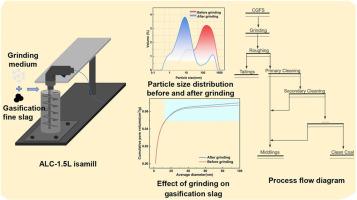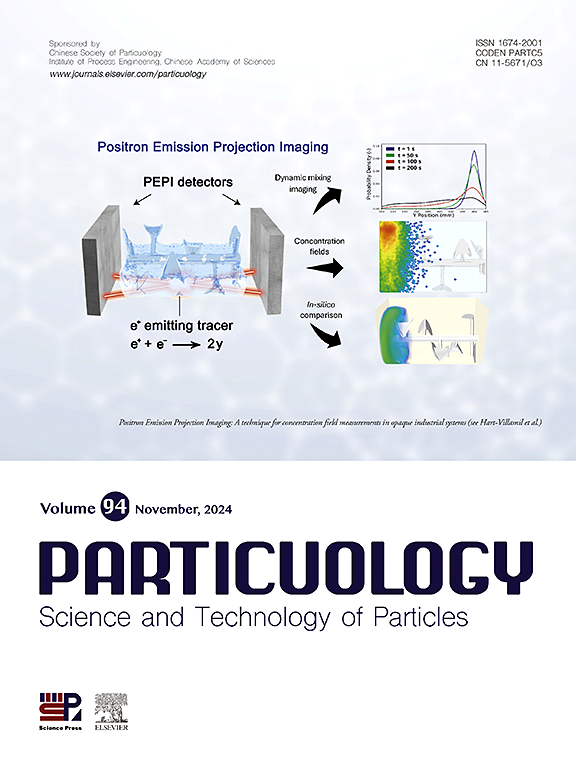Research on the mechanism of pre-grinding and multi-stage flotation of coal gasification fine slag
IF 4.3
2区 材料科学
Q2 ENGINEERING, CHEMICAL
引用次数: 0
Abstract
The paper focused on the fine-grinding pretreatment of coal gasification fine slag (CGFS) from gasification settling tank in Shaanxi Yulin, China. The mechanism by which grinding promotes the flotation performance of CGFS was explored through particle size distribution analysis, surface morphology examination, and porosity analysis. A multi-stage flotation process was employed to determine the optimal flotation regime. The experimental results demonstrated that grinding significantly reduced the overall particle size and improved the structure and composition of CGFS. After grinding, the particle size D [4, 3] decreased to 47.612 μm, and the average pore diameter increased by 0.1335 nm. The grinding process effectively dissociated the glassy intergrowth structures, resulting in a significant reduction in reagent consumption. With a compound collector dosage of 9 kg/t and frother dosage of 3 kg/t, the optimized flotation process—including one roughing stage and three cleaning stages—yielded a clean coal ash content of 16.96 % and a tailing loss on ignition value of 2.29 %, meeting the standards for Class I fly ash.

煤气化细渣预磨多级浮选机理研究
对陕西榆林某煤气化沉降池的煤气化细渣进行了细磨预处理。通过粒度分布分析、表面形貌检测和孔隙率分析,探讨磨矿提高CGFS浮选性能的机理。采用多级浮选工艺确定了最佳浮选制度。实验结果表明,磨削显著降低了CGFS的总体粒径,改善了CGFS的结构和组成。研磨后,粒径D[4,3]减小至47.612 μm,平均孔径增大0.1335 nm。研磨过程有效地解离了玻璃状的共生结构,从而显著减少了试剂的消耗。在复合捕收剂投加量为9 kg/t、起泡剂投加量为3 kg/t的条件下,优化后的浮选工艺包括1个粗选阶段和3个精选阶段,净煤灰分含量为16.96%,尾矿燃失值为2.29%,达到一级粉煤灰标准。
本文章由计算机程序翻译,如有差异,请以英文原文为准。
求助全文
约1分钟内获得全文
求助全文
来源期刊

Particuology
工程技术-材料科学:综合
CiteScore
6.70
自引率
2.90%
发文量
1730
审稿时长
32 days
期刊介绍:
The word ‘particuology’ was coined to parallel the discipline for the science and technology of particles.
Particuology is an interdisciplinary journal that publishes frontier research articles and critical reviews on the discovery, formulation and engineering of particulate materials, processes and systems. It especially welcomes contributions utilising advanced theoretical, modelling and measurement methods to enable the discovery and creation of new particulate materials, and the manufacturing of functional particulate-based products, such as sensors.
Papers are handled by Thematic Editors who oversee contributions from specific subject fields. These fields are classified into: Particle Synthesis and Modification; Particle Characterization and Measurement; Granular Systems and Bulk Solids Technology; Fluidization and Particle-Fluid Systems; Aerosols; and Applications of Particle Technology.
Key topics concerning the creation and processing of particulates include:
-Modelling and simulation of particle formation, collective behaviour of particles and systems for particle production over a broad spectrum of length scales
-Mining of experimental data for particle synthesis and surface properties to facilitate the creation of new materials and processes
-Particle design and preparation including controlled response and sensing functionalities in formation, delivery systems and biological systems, etc.
-Experimental and computational methods for visualization and analysis of particulate system.
These topics are broadly relevant to the production of materials, pharmaceuticals and food, and to the conversion of energy resources to fuels and protection of the environment.
 求助内容:
求助内容: 应助结果提醒方式:
应助结果提醒方式:


